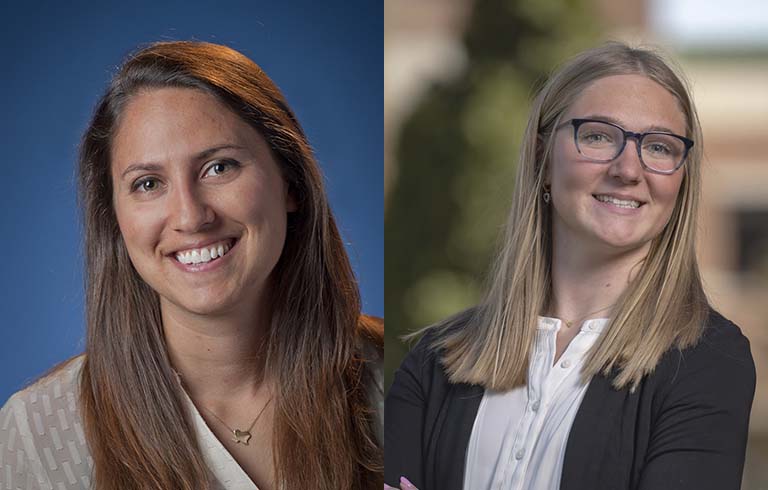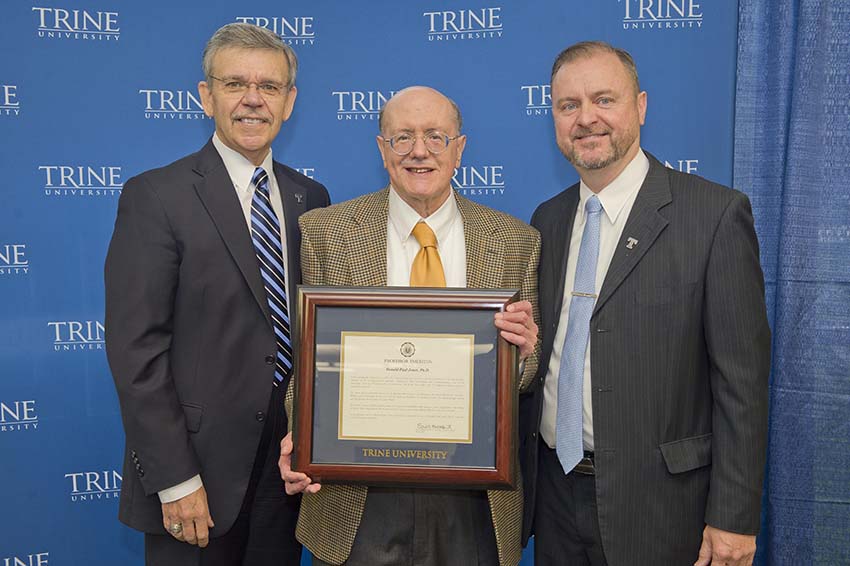
Two from Trine named to Forty Under 40
A Trine University administrator and a graduating senior are included in this year’s Greater Fort Wayne Business Weekly Forty Under 40.
July 22, 2019

Don Jones, Ph.D., had taught at nine other universities before arriving at Tri-State. The camaraderie he found here, as well as the university’s emphasis on teaching over research, convinced him to stay here.
Jones, who became an emeritus professor at the end of the spring 2019 semester, arrived at Tri-State in the fall of 1996. His prior experience included teaching at Big 10 schools like the University of Minnesota and University of Illinois as well as small private colleges like Drury College in Springfield, Missouri.
“My prior experience taught me to value collegiality among faculty, and that is what I found in abundance at Tri-State, especially with the English faculty I joined in Taylor Hall,” he recalled. “Also, my research was in the rhetoric of science and technology, and I had experience in public relations and politics, and I saw at Tri-State the opportunity to develop both what became the ENG 133 Technical Communication course and a communication program with strong training in public relations.”
He also enjoyed Tri-State’s smaller class sizes.
“At Missouri State each semester I had taught a communication theory class with 240 students and a rhetorical theory class with 100 students,” he said. “I looked forward to teaching small classes and developing relationships with my students.”
He has witnessed tremendous changes during his 23 years at Tri-State and Trine. As faculty president at the turn of the millennium, he was part of the search committee that hired Earl D. Brooks II, Ph.D., as Tri-State’s 16th president.
“I still vividly recall his first address to the faculty and the long list of things he wanted to accomplish. As an inveterate note-taker, I took detailed notes,” he said. “The university has been transformed along the lines he envisioned.”
While the university has grown substantially, Jones said the important elements of a Trine education have not changed.
“The size of classes is still relatively small and we continue to emphasize teaching students,” he said, “and our faculty continue to be quite collegial.”
He has been pleased to see communication graduates succeed in their careers, and some of his favorite memories are working with students in settings outside the classroom. When one graduating senior had a conflict between his wedding and Commencement, Jones put together an impromptu graduation ceremony for him and his family in Wells Theater, with his wife providing a reception and food afterward in Wells Gallery.
“I loved giving the mini-Commencement address and performing the ceremony, and it was a wonderful experience for everyone, including me,” he said.
There were also playful moments with colleagues. After one English faculty member attended a conference on extraterrestrial communication, she received communications from “aliens” for more than a month until Jones confessed to being behind the prank.
“I also have fond memories of ‘broiling’ my friend Dr. Tom Tierney at his retirement roast,” Jones said. “I had a lot of fun writing and giving that speech, which tried to ironically emulate his distinctive style of both humorous insulting and speech writing.”
Jones said he expects to be more active in retirement than he was as a full-time faculty member.
“I have begun outlining a book on the philosophy, theory and techniques of rapid skill growth,” he said. “The book will combine developments from the fields of communication, psychology and neurology, along with experiential knowledge I developed as a communication consultant and trainer, a successful speech and debate coach, and a rapidly developing student of Tai Chi. My thesis is that all skills are synergistically interrelated, whether you are talking about skills of communication, reasoning, problem solving, learning, athletics, job performance, etc., and that utilizing five or six basic principles enables you to rapidly and synergistically ‘grow’ any and all of your skills.”
He plans to offer communication consulting and training in areas such as listening, conflict management, speech writing, politics and government relations.
“Also, I have presented or published at least one new scholarly paper each year for several years, and I plan to more than double that pace,” he said.
He plans to continue his study of Qigong and Tai Chi, and may eventually become a sifu (teacher) of the martial arts.
“Finally, I love hiking, scrambling up mountains, cooking and playing chess, and I plan to now do a lot of that in any spare time that I may have,” he said.